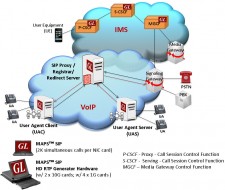GL Enhances SIP Protocol Emulator With EVS and OPUS Audio Codecs

Gaithersburg, Maryland, May 16, 2017 (Newswire.com) - GL Communications Inc. announced today its enhanced SIP Protocol Emulator software referred to as MAPS™ SIP Protocol Emulator that help users generate and receive SIP Signalling with traffic.
Speaking to the press, Mr. Karthik Ramalingam, a Senior Manager for product development of the company, said, “GL's Message Automation & Protocol Simulation (MAPS™) designed for SIP testing can simulate User Agents (User Agent Client-UAC, User Agent Server-UAS), Proxy, Redirect, Registrar and Registrant servers. It can be used to simulate any interface of the VoIP network.”
The enhanced SIP Protocol Emulator software MAPS™ SIP Protocol Emulator that help users to generate and receive SIP Signalling with traffic. The enhanced SIP Protocol Emulator software now provided with support for EVS and OPUS Audio Codecs.IP Address Spoofing, which helps the user to simulate multiple User Agents each using unique IP (virtual) address within single instance of MAPS SIP. MAPS™ SIP is enhanced to support maximum simultaneous calls with different traffic types. Supported traffic types include the following: Transmit and detect RTP traffic such as Voice, Video, Fax (T.38), Digit.
Mr. Shelley Sharma, Chief Marketing Officer
While explaining on enhancements introduced, he said, “The enhanced SIP Protocol Emulator software now provided with support for EVS and OPUS Audio Codecs. Enhanced Voice Services (EVS) is a super-wideband speech audio coding standard. It offers up to 20 kHz audio bandwidth and has high robustness to delay jitter and packet losses due to its channel aware coding and improved packet loss concealment. It has been developed in 3GPP and is described in 3GPP TS 26.441. EVS supports sampling rates 8K (Narrowband), 16K (Wideband), 32K (Super-wideband) and 48K (Fullband). The application areas of EVS consist of improved telephony and teleconferencing, audio-visual conferencing services, and streaming audio.
Opus is a versatile audio codec standardized by the Internet Engineering Task Force as RFC6716. Opus is unmatched for interactive speech and music transmission over the Internet, but is also intended for storage and streaming applications. It can scale from 6 kbit/s narrowband mono speech to 510 kbit/s fullband stereo music. It supports both constant bit rate (CBR) and variable bitrate (VBR). Opus can handle a wide range of audio applications, including Voice over IP, videoconferencing and even remote live music performances.”
Mr. Ramalingam further added, “Enhanced MAPS™ SIP application also now supports "IP Address Spoofing", which helps the user to simulate multiple User Agents each using unique IP (virtual) address within single instance of MAPS SIP.
The virtual IP addresses can be easily added with simple configurations in the ‘UserAgent’ Profiles within the application.
The call generation feature within MAPS™ SIP is enhanced to control script execution iterations. Now, it is possible to set the selected script within the Call Generation to be executed for the required number of iterations.
MAPS™ SIP is enhanced to support maximum simultaneous calls with different traffic types. Supported traffic types include the following: Transmit and detect RTP traffic such as Voice, Video, Fax (T.38), Digits, and Tones (Single and Dual). Live speech can also be transmitted and played back on the call using a headphone and speaker.
Further, IP traffic can be prioritized in the network by configuring DSCP (Differentiated Services Code Point) values in signaling and voice packets.
MAPS™ SIP also facilitates simulation of failed call scenarios with auto and manual call rejection options. Easy configurations to setup auto call rejection scenario along with the cause for failed calls. Call can be rejected with any of the SIP defined errors like client errors (4XX Failures), server errors (5XX Failures), and global errors (6XX Failures). Some of the example reasons for Request, Server, and Global Failure.
The enhanced SIP Emulator software now supports RTP Session Update during Call that provides an option to apply Re-Invite event to update established RTP session with new IP address, Port number, Codec parameters, etc.”
About GL Communications Inc.
GL Communications Inc. is a global provider of test and measurement solutions and has over the years worked with major telecom equipment vendors, service providers, and system integrators to meet the testing requirements arising at various stages of telecom products development life cycle.
GL offers a broad set of test solutions that help perform all types of testing on networks, from initial system design, to fine-tuning, troubleshooting, live deployment, and monitoring. The products are widely used to verify and ensure 'quality and reliability' of Wireless (4G LTE, 3G, 2G), SONET/SDH, IP, TDM, and PSTN networks.
GL core product development is backed by a strong team of R&D experts to match evolving market and technical challenges in a most cost-effective and innovative way.
Contact:
Shelley Sharma
Phone: 301-670-4784
E-mail: info@gl.com
Source: GL Communications Inc.